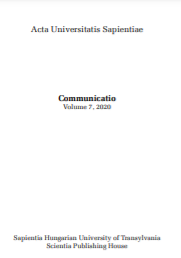Affective and Cognitive Dimensions of Trust in Communication
Affective and Cognitive Dimensions of Trust in Communication
Author(s): Barna KovácsSubject(s): Philosophy, Psychology, Communication studies
Published by: Scientia Kiadó
Keywords: trust; distrust; affective trust; cognitive trust; speech act theory;
Summary/Abstract: Based on the complexity of communication acts, the paper presents how affective and cognitive aspects are intertwined. First of all, the context of trust and the conditions of its appearance are examined. It is followed by an analysis of trust as an attitude which reveals the difference between contractual approaches and alliances. The relationship between communication and trust is presented by the illocutionary acts. As a result of the analysis, trust can be conceived as a positive attitude of expectation, where one person relies on the assumed good faith, suitability, and sensitivity of the other person, where, although vulnerable, the one who trusts counts on the fact that the trusted person will not abuse his/her position but rather provide assistance to his/her best knowledge in a given area. Cognitive trust is reinforced if the proper data are available, understandable, fit into prior knowledge, and anticipate the possible forms of operation. With affective trust, the issue is not data quality and quantity but rather the way how they are presented.
Journal: Acta Universitatis Sapientiae, Communicatio
- Issue Year: 2020
- Issue No: 7
- Page Range: 13-24
- Page Count: 12
- Language: English

